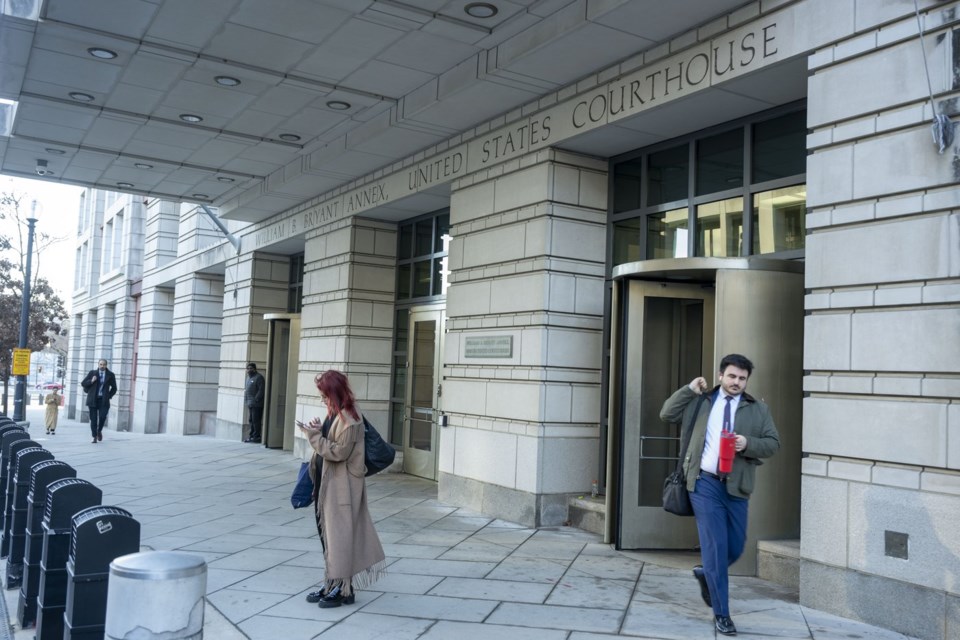WASHINGTON (AP) ā A federal judge on Monday refused to immediately order the White House to restore The Associated Pressā access to presidential events, saying the news organization had not demonstrated it had suffered any irreparable harm. But he urged the Trump administration to reconsider its two-week-old ban, saying that case law āis uniformly unhelpful to the White House.ā
U.S. District Judge Trevor N. McFaddenās decision was only for the moment, however. He told attorneys for the Trump administration and the AP that the issue required more exploration before ruling.
McFadden said the AP had not proven harm requiring an immediate restraining order. But he cautioned the White House that the law wasnāt on its side in barring AP over continuing to refer to the Gulf of Mexico, not simply the āGulf of Americaā as Trump decreed in an executive order.
āIt seems pretty clearly viewpoint discrimination,ā McFadden told Brian Hudak, a government attorney.
With no ruling made, the White House is free to continue barring the AP from the Oval Office and beyond. The case promised to stretch at least until March 20, when an additional hearing was set.
AP spokesperson Lauren Easton had this to say after the hearing: āWe look forward to our next hearing on March 20 where we will continue to stand for the right of the press and the public to speak freely without government retaliation. This is a fundamental American freedom.ā
The White House, meanwhile, began displaying a pair of monitors in the briefing room reading āGulf of Americaā and āVictory," which it declared: āAs we have said from the beginning, asking the President of the United States questions in the Oval Office and aboard Air Force One is a privilege granted to journalists, not a legal right."
Is singling out one news organization āviewpoint discriminationā?
Hudak said that just because an AP reporter and photographer had long held a place in the White House press pool didn't mean the agency was entitled to it in perpetuity.
āThatās not just special access. Thatās extra-special access,ā Hudak said, noting that AP journalists continue to access the White House and publish news from events, even when its journalists are not present in the room where they happen. āThe president can choose who to speak with.ā
Charles Tobin, an attorney representing the AP, said it wasnāt a matter of whether Trump had to speak to the agencyās reporters, but that singling the agency out amounted to a āconstitutional problem."
āWeāre not arguing that the president of the United States has to answer The Associated Pressā questions,ā Tobin said. āThe issue is that once he lets the press pool in he canāt say, āI donāt like you. Youāre fake news. Get out.āā
McFadden, a Trump nominee, subjected both sides to intense questioning.
Discussing the composition of the āpress poolā that is chosen by the White House Correspondentsā Association, he questioned why the government was obligated to follow those choices, saying āit feels a little odd that the White House is somehow bound by the decisions this private organization is making.ā
Later, though, in an exchange with Hudak, he said āThe White House has accepted the correspondentsā association to be the referee here, and has just discriminated against one organization. That does seem problematic.ā
The dispute is over AP style
Earlier this month, the Trump administration , Air Force One and other areas ā some of which have been open to the agency for a century as part of the White House press pool.
That came after the AP said last month that it would adhere to the āGulf of Mexicoā terminology because its audience is global and the waters are not only in U.S. territory. However, it is acknowledging Trumpās rechristening as well.
The AP filed suit Friday, naming three Trump officials ā White House chief of staff Susan Wiles, deputy chief of staff Taylor Budowich and press secretary Karoline Leavitt ā as defendants. The agency, a not-for-profit news organization in operation since 1846, called the White Houseās move a ātargeted attackā that āstrikes at the very core of the First Amendment.
Budowich was in court at the defendants' table. The AP's chief White House correspondent, Zeke Miller, sat with the plaintiffs' attorneys; its executive editor, Julie Pace, sat in the front row of spectators.
Dozens of news organizations signed a letter last week urging the White House to reverse its policy. The signees included Trump-friendly outlets like Fox News Channel and Newsmax.
as an organization of āradical left lunaticsā and said āWeāre going to keep them out until such time as they agree that itās the Gulf of America.ā
In an email to AP, Wiles said the news organization was targeted because its influential stylebook is used as a standard by many journalists, scholars and students across the country, the lawsuit said. She said the administration was hopeful the name change would be reflected in the AP Stylebook āwhere American audiences are concerned.ā
The AP Stylebook is used by international audiences as well as within the United States. The AP has said that its guidance was offered to promote clarity, and that even though Gulf of Mexico will continue to be used, journalists should also note Trumpās action to change the name.
A Trump executive order to change the name of the United Statesā largest mountain back to Mount McKinley from Denali is being recognized by the AP Stylebook. Trump has the authority to do so because the mountain is completely within the country he oversees, AP has said.
It isnāt the first case of its kind, nor even the first to involve Trump. In Trumpās first term, reporter Jim Acosta of CNN had his White House credentials revoked. After CNN sued, another federal judge appointed by Trump ruled in Acostaās favor to restore access.
Matt Sedensky, The Associated Press



